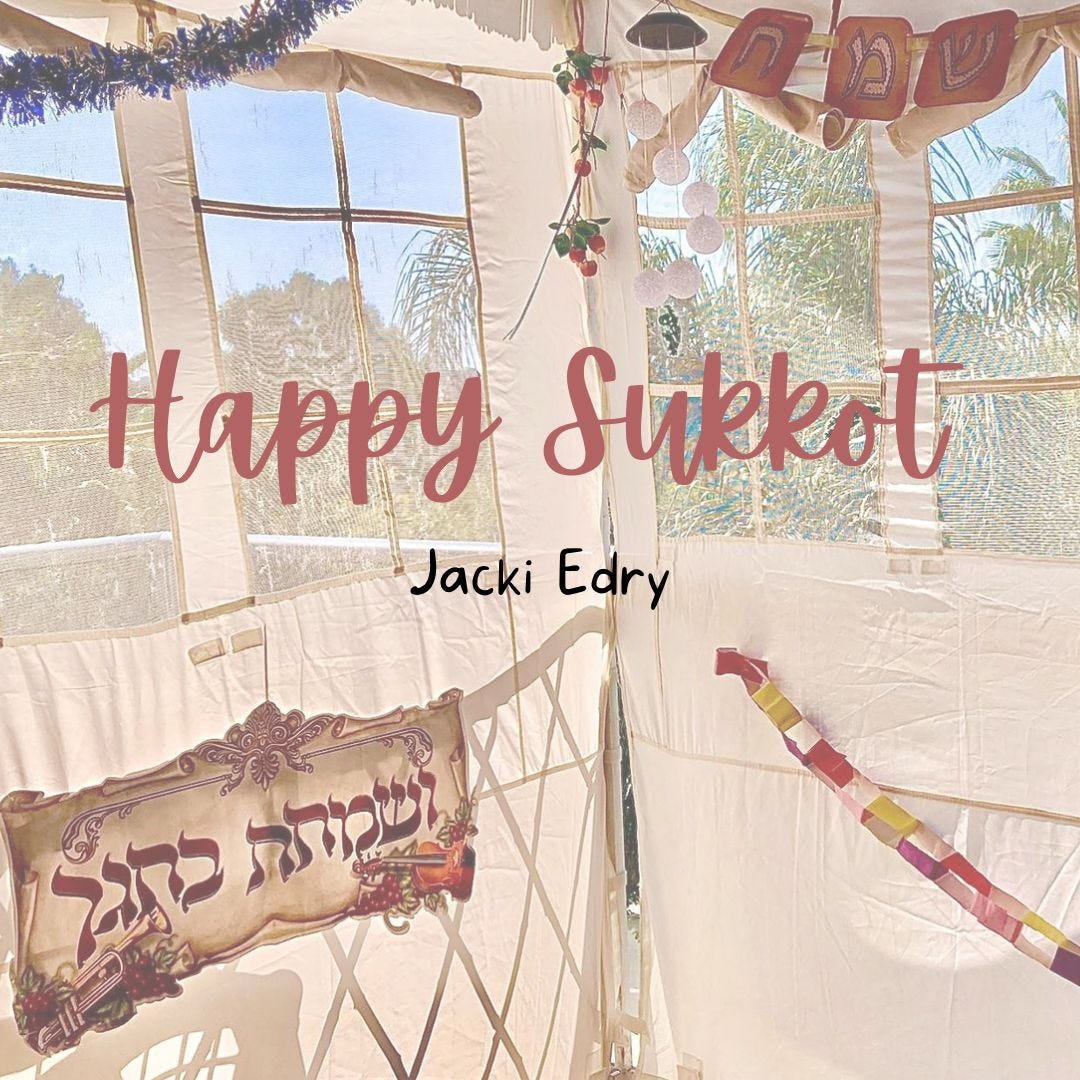Sukkot is one of my favorite holidays. Every year, as the holiday season approaches, I dreamily anticipate the moment we will gather in our colorfully decorated sukkah, welcome the ushpizin (holy guests), say the holiday blessings, and begin the week of festivities.
Sukkot is a particularly celebratory holiday with many beautiful and symbolic halachot (Jewish laws and rituals). I'd like to explore a few of them that particularly resonate with me.
The first is the arb'a minim- the four species (hadas, lulav, arava, and etrog). We bind (and hold) them together, say the blessings, and wave them back and forth. One of the symbolic meanings in the midrash is that the arb'a minim represent the different types of people in Am Israel- the nation of Israel.
The hadas (myrtle) has no taste but has a pleasant fragrance, representing someone who fulfills mitzvot but does not study Torah.
The lulav (date palm) has no fragrance, but the fruit from the date tree has taste, representing someone who studies Torah but does not carry out mitzvot.
The etrog (citron) has a pleasant taste and fragrance, representing someone who studies Torah and fulfills mitzvot.
The arava (willow) has no fragrance or taste, representing someone who does not perform mitzvot or study Torah.
The mitzvah of netilat lulav- holding, blessing, and waving the lulav- requires the lulav, hadas, and arava to be bound together. The person performing the mitzvah takes the lulav in one hand and the etrog in the other and then joins them together throughout the netilat lulav. All four species must be unified to carry out the mitzvah.
This unification is symbolically significant for Jewish people. It reminds us that we must also join together as one people, and every person, regardless of their differences or degree they fulfill mitzvot, is essential for us to be considered Am Israel.
It also reminds us that we are all G-d's children, each with a specific shlichout (mission) to fulfill. We all come in different shapes and sizes and have differing abilities and, at times, disabilities. But every one of us is a divine individual, created by G-d, exactly as He wishes us to be.
In keeping with this, we must all do everything in our power to practice Ahavta l'reyacha c'mocha – to love thy neighbor as thyself. We must learn to love, respect, and accept all members of our communities, no matter how different they may appear to be. Every person plays a unique role in the divine tapestry that makes up Am Israel.
The second halacha and tradition I'd like to explore is "Ve samachta behagecha" (You shall rejoice on your holiday). Sukkot is known to be a holiday of joy, and an integral part of celebrating Sukkot is to remain in a festive mood throughout the week. Although this is easy to say, maintaining a jovial mindset for the entire holiday period often requires effort.
Members of our communities who are disabled, neurodivergent or have differing challenges may need support to help them achieve this type of joyous mindset. Therefore, community members and leaders must go out of their way to make the accommodations necessary to ensure that all members will have the opportunity to join in on the festivities because they are valued members of the community.
Here are a few suggestions to help you ensure your community is welcoming and inclusive:
Before the holiday, ask community members if they need accommodations to help them feel comfortable, such as organizing the physical environment to ensure accessibility, providing a quiet area for sensory-sensitive individuals, and more.
When planning activities, ask for input and ideas from community members with differing needs and try to incorporate some of their ideas for programs. Also, be sure to provide them with all the accommodations they will need to enable them to join in.
Organize a team of volunteers to provide support and assistance if needed.
For me, Sukkot is a magical holiday celebrating unity, happiness, joy, and the love of HaShem and Am Israel. I pray that we will all internalize the essence of Sukkot and take it upon ourselves to discover and appreciate the beauty of our differences and that we will do our best to create loving and inclusive communities.
Wishing you all a blessed, festive holiday filled with love, health, and joy! Jacki
Sources:
https://www.chabad.org/library/article_cdo/aid/4515/jewish/The-Unity-of-Our-People.htm
https://www.chabad.org/library/article_cdo/aid/609564/jewish/The-Lulav-and-Etrog-The-Four-Kinds.htm
About the author
Jacki Edry published her first book "Moving Forward: Reflections on Autism, Neurodiversity, Brain Surgery, and Faith" in 2021, and shortly after that, she launched her blog. She is a Hampshire College graduate with an extensive background in education, writing, lecturing, and marketing. She has been exploring the world of autism and neurodiversity for over thirty-five years. She has also spent many years advocating for inclusion and educational reform. Her work as a neurodiversity advocate has been recognized worldwide, and in 2023 she was chosen as one of the top 50 Neurodiversity Evangelists by ND by design, powered by Dynamis.
Jacki was born and raised in NY, and upon completion of her studies, she made Aliyah to Israel, where she resides with her husband, children, and dog.
To learn more about Jacki's work and ideas, please visit:
Blog and website: www.jackisbooks.com.
LinkedIn: https://www.linkedin.com/in/jacki-edry-7583346/
Facebook: https://www.facebook.com/jackisbooks



